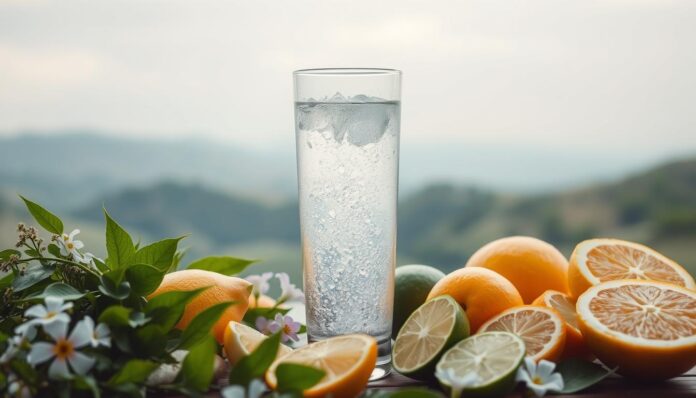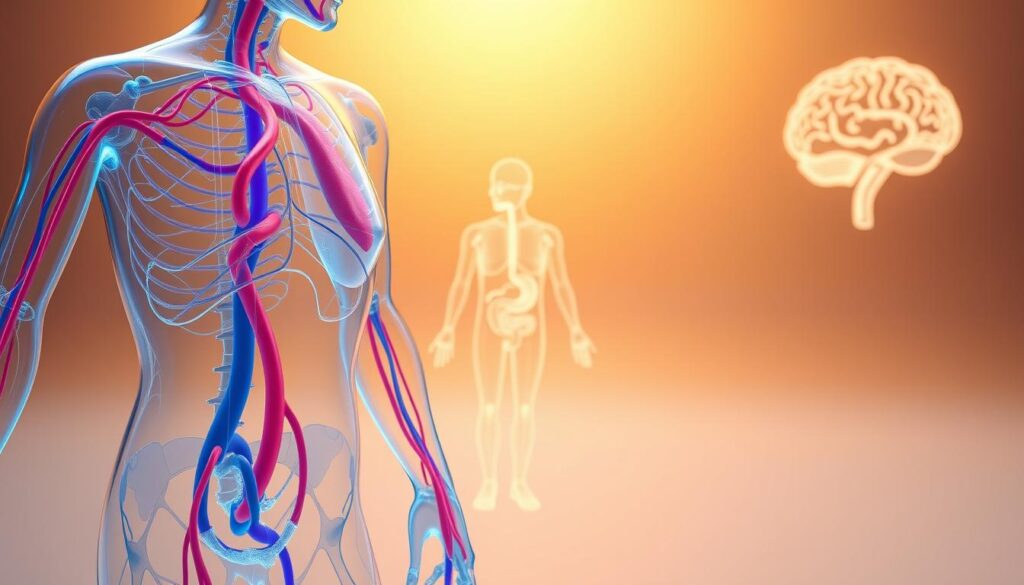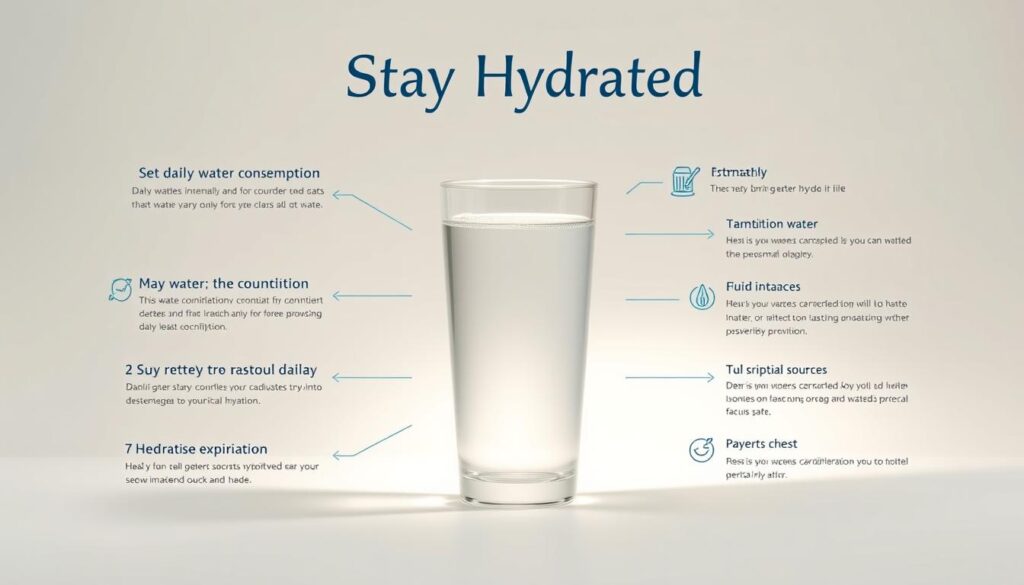Sarah Thompson stood at the edge of the Grand Canyon, her water bottle empty. The Arizona sun was beating down relentlessly. Her hiking guide’s words echoed in her mind: “Hydration isn’t just about drinking water—it’s about keeping your body functioning at its best.” This moment became a turning point in understanding the critical nature of healthy hydration habits.
Water is the essence of life, and your body relies on proper hydration for optimal performance. Hydration tips for optimal health go beyond simply drinking liquids. They represent a complete approach to maintaining your body’s balance. Every cell, tissue, and organ depends on enough water to perform essential functions.
Your journey to understanding hydration begins with recognizing its profound impact on overall wellness. From regulating body temperature to supporting critical metabolic processes, water plays a key role. It keeps you healthy and energized.
Key Takeaways
- Water is essential for every bodily function
- Hydration impacts physical and mental performance
- Individual water needs vary based on activity and environment
- Consistent hydration supports long-term health
- Listening to your body’s hydration signals is key
Understanding the Importance of Proper Hydration
Water is a superhero for human health, essential for your body’s functions. It helps regulate temperature and transport nutrients. Hydration benefits go beyond just quenching thirst.
Knowing how water affects your body can change your health habits. Water is more than a drink; it’s a key part of your body’s workings.
Role of Water in Body Functions
Your body needs water for many important tasks:
- Temperature regulation
- Nutrient transportation
- Waste removal
- Joint lubrication
- Cellular processes
Impact on Heart Health and Circulation
Drinking enough water helps your heart and blood flow better. When you’re well-hydrated, your heart doesn’t have to work as hard to pump blood. This makes your heart and blood flow more efficiently.
| Hydration Level | Heart Performance | Blood Circulation |
|---|---|---|
| Optimal | Efficient Pumping | Smooth Flow |
| Dehydrated | Increased Effort | Restricted Movement |
Benefits of Staying Well-Hydrated
Drinking enough water has many benefits for your body and mind. It boosts energy, improves thinking, and enhances physical performance. Hydration is a natural way to improve your body’s function.
- Boosts energy levels
- Supports mental clarity
- Promotes healthy skin
- Aids digestion
- Supports immune function
Every person’s water needs are different. Listen to your body and drink water regularly throughout the day.
Daily Water Requirements for Optimal Health
Knowing how much water you need each day is key to staying healthy. Your personal needs can change based on many factors. Men and women have different water intake guidelines to keep them hydrated.
Experts recommend the following daily water intake:
- Women: About 9 cups (2.2 liters) per day
- Men: About 13 cups (3.0 liters) per day
Several things affect how much water you need:
- Age and health
- How active you are
- The weather and where you live
- Your weight and how fast you metabolize
| Factor | Impact on Water Intake |
|---|---|
| Exercise | Increases water needs by 1-2 cups |
| Hot Climate | Needs extra 2-3 cups of water |
| Medical Conditions | May need special hydration plans |
Pro tip: Don’t wait until you feel thirsty to drink water. Drinking water all day is important to reach your hydration goals.
Remember, water intake is not just about quantity, but also about maintaining a steady intake that supports your body’s needs.
Signs and Symptoms of Dehydration
It’s important to know the signs of dehydration to stay healthy. Your body gives you clues when it needs water. Understanding these signs helps you act fast.
Physical Indicators
Knowing the physical signs of dehydration is key. Look out for these:
- Dry or sticky mouth
- Reduced urine output
- Dark-colored urine
- Muscle cramps
- Dry skin that lacks elasticity
- Extreme thirst
Mental and Cognitive Signs
Dehydration affects your mind too. Watch for these mental signs:
- Difficulty concentrating
- Sudden mood changes
- Persistent fatigue
- Reduced cognitive performance
- Light-headedness
Emergency Warning Signals
Some dehydration symptoms are serious and need immediate help. If you see these signs, get medical help right away:
- Rapid heartbeat
- Extreme dizziness
- Confusion or disorientation
- Fainting
- Chest pain
Early spotting of dehydration signs can stop serious health problems.
Hydration Tips for Optimal Health
It’s key to develop good hydration habits for your health. Drinking water is just the start. It’s about finding ways to keep your body hydrated all day.
Begin by making it easy to drink water. Get a good, reusable water bottle to carry with you. This helps you keep track of your water and stay hydrated.
- Choose a water bottle with volume markings
- Select an insulated design to keep water cool
- Pick a size that matches your daily water requirements
Make drinking water fun with these tips:
- Infuse water with fresh fruits like lemon, cucumber, or berries
- Use natural flavor enhancers like mint leaves or ginger
- Experiment with herbal tea as a hydration alternative
Use digital tools to help with your hydration. Apps can track your water, remind you, and help you stay on track.
“Hydration is not just about drinking water, but creating a lifestyle that prioritizes your body’s fluid needs.”
Your body’s hydration needs change based on your activity, where you live, and your health. Pay attention to how you feel and adjust your water intake.
Smart Strategies for Increasing Water Intake
Creating healthy hydration habits needs planning and effort. You can make drinking water fun and easy with smart strategies.
Technology helps a lot with staying hydrated. Smartphones and apps have cool ways to track your water intake.
Creating a Daily Hydration Schedule
Having a set hydration plan makes it a habit. Here are some tips:
- Drink water as soon as you wake up
- Carry a water bottle to work
- Take water breaks at the same times every day
- Drink water with your daily activities
Using Technology and Apps
Digital tools can boost your hydration habits. Many apps offer:
- Custom water intake plans
- Water tracking and logging
- Reminders and motivational alerts
- Link with fitness and health apps
Setting Reminders and Goals
Setting achievable hydration goals keeps you motivated. Start small and increase your water intake slowly. Use phone alarms or app alerts to remind you to drink water. This will become second nature over time.
Tracking your hydration regularly makes it a part of your lifestyle.
Beyond Water: Alternative Hydration Sources
Staying hydrated is more than just drinking water. Your body can get water from many tasty and healthy sources. While water is key, trying other sources can make staying hydrated fun.
Fruits and veggies are great for staying hydrated. They give you water and important vitamins and minerals. Here are some top picks:
- Watermelon (92% water content)
- Cucumber (95% water)
- Strawberries (91% water)
- Spinach (91% water)
- Zucchini (95% water)
Beverages are also important for staying hydrated. Low-fat milk, herbal teas, and coconut are great alternatives. They add extra nutrients to your hydration routine.
| Hydration Source | Water Content | Additional Benefits |
|---|---|---|
| Coconut Water | 95% | Electrolytes, Potassium |
| Herbal Tea | 99% | Antioxidants, Relaxation |
| Low-Fat Milk | 87% | Calcium, Protein |
Pro tip: Mix and match these hydration sources to keep your fluid intake interesting and nutritionally diverse.
“Hydration is not just about water, but about making smart, tasty choices that nourish your body.” – Nutrition Expert
Understanding Electrolyte Balance
Your body needs more than just water to stay healthy. Electrolyte balance is key for good health and body function. These minerals carry electrical charges that help control important body processes.
Electrolytes help keep your body hydrated by managing fluid levels. Without the right balance, you might feel tired or face health issues.
Role of Electrolytes in Hydration
Electrolytes work with your cells to keep fluid levels right. They help:
- Regulate nerve and muscle function
- Maintain blood acidity and pressure
- Rebuild damaged tissue
- Transport nutrients into cells
Natural Sources of Electrolytes
You can get electrolytes from natural foods:
- Bananas – Rich in potassium
- Coconut water – Natural electrolyte drink
- Leafy green vegetables
- Nuts and seeds
Keeping electrolytes in balance helps your body stay hydrated and energized. Knowing about these minerals can improve your health and wellness.
Hydration During Physical Activity
When you’re active, staying hydrated is key for your health and performance. It’s important to prevent dehydration to keep your body balanced during exercise. Every pound of sweat you lose means you need to drink a pint of water right away.
Your hydration plan should change based on the activity you’re doing. Athletes and those who work out need to drink plenty of water before, during, and after their workouts.
- Pre-workout: Drink 16-20 ounces of water 2-3 hours before exercise
- During workout: Consume 7-10 ounces every 10-20 minutes
- Post-workout: Replenish with 16-24 ounces for every pound lost
Different sports and exercise levels need different hydration strategies. High-intensity activities like football or marathon running require more careful fluid replacement. A high school football player can lose up to 5 pounds of sweat during a summer practice, showing how important hydration is.
Look out for signs of dehydration, like dark urine, muscle cramps, or feeling less energetic. Your body’s hydration needs change based on how active you are, the temperature, and your individual health.
“Water is the most critical nutrient for athletic performance” – Sports Nutrition Experts
Drinks with electrolytes are good for long or intense activities. They help keep your body’s mineral balance and prevent dehydration.
Special Hydration Considerations for Different Age Groups
Hydration needs change as we age. Knowing how much water each age group needs is key to staying healthy. Each stage of life brings its own hydration challenges.
Water needs vary with age. It’s important to adjust your water intake as you grow older.
Children and Adolescents: Building Healthy Hydration Habits
Young bodies need water for growth. Kids and teens need special ways to stay hydrated.
- Encourage regular water consumption throughout the day
- Pack water bottles for school and activities
- Make hydration fun with colorful water bottles
- Limit sugary drink alternatives
Adults and Seniors: Managing Changing Hydration Needs
As we age, our bodies change how they handle water. Adults, and seniors with health issues, need to focus on staying hydrated.
- Monitor water intake more closely after 50
- Adjust fluid consumption for medications
- Be aware of reduced thirst sensation
- Consider electrolyte balance
Athletes and Active Individuals: Specialized Hydration Strategies
Those who are very active need special hydration plans. This helps them stay in top shape and avoid dehydration.
- Drink water before, during, and after exercise
- Replace electrolytes during intense workouts
- Calculate individual sweat rate
- Use sports drinks for extended activities
Remember, your hydration needs are unique. Consult healthcare professionals for personalized guidance tailored to your specific health conditions and lifestyle.
Water Quality and Safety Tips
Keeping water quality high is key to staying healthy. Your drinking water affects your health a lot. So, it’s important to know how to check and boost water safety.
When checking water quality, look at these important points:
- Source of water (municipal, well, bottled)
- Potential chemical contaminants
- Mineral content and pH levels
- Potential microbial risks
At home, you can do a few things to better your water quality and stay hydrated:
- Install a certified water filtration system
- Regularly test your water source
- Replace water filter cartridges as recommended
- Store water in clean, food-grade containers
Pro tip: Contact your local water utility for detailed water quality reports and current safety information. Knowing your water’s details helps you choose the right purification methods.
Think about getting high-quality water testing kits. They can spot contaminants like lead, chlorine, and bacteria. These tools give you important info on your water’s safety and help with staying hydrated.
Clean water is not a luxury—it’s a fundamental requirement for maintaining optimal health.
Seasonal Hydration Guidelines
Staying hydrated changes with the seasons and weather. You need to adjust your hydration plan to avoid dehydration.
Summer brings big hydration challenges. The heat and sun make you sweat more. You need to drink more water to keep your body working right.
- Drink water before feeling thirsty
- Increase fluid intake during outdoor activities
- Wear light, breathable clothing
- Avoid peak sun hours when possible
In winter, staying hydrated is key. Cold weather can hide signs of dehydration. You must drink water regularly to keep your body moist.
| Season | Hydration Recommendations | Daily Water Intake |
|---|---|---|
| Summer | Increase water consumption | 2.7-3.7 liters |
| Winter | Maintain consistent intake | 2.2-3.0 liters |
“Water is the driving force of all nature.” – Leonardo da Vinci
Travel and changes in altitude also affect hydration. Always adjust your water intake based on your environment and activity level. Listen to your body and drink water often to stay healthy.
Conclusion
Learning to stay hydrated is more than just drinking water. It’s about making healthy habits that improve your well-being. Start by understanding your body’s needs and finding ways to drink enough water.
In this guide, you’ve picked up key tips for drinking more water. You now know how to spot dehydration and find different ways to stay hydrated. The most important thing is to drink water and other fluids regularly and with purpose.
Keeping your body hydrated is a big part of staying healthy. By following these tips, you’ll help your body and mind work better. Start with small changes and stick to them. You’ll see big improvements in your life.
Every time you drink water, you’re doing something good for yourself. Listen to your body and choose to drink wisely. This will help you feel more alive and healthy.






